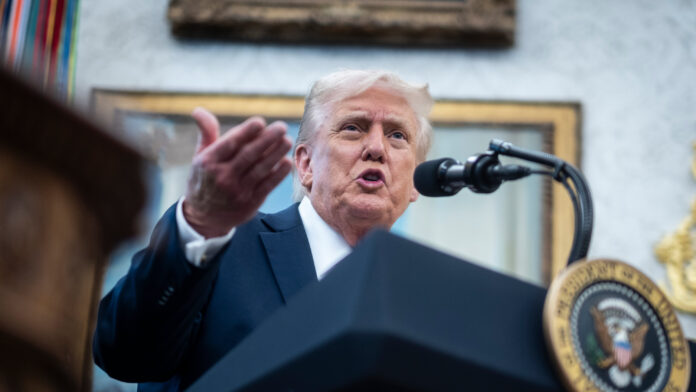Trump Declares Cartels as Terrorist Organizations
Former U.S. President Donald Trump has escalated his crackdown on international drug cartels by officially designating them as terrorist groups. In a move that stunned Washington and triggered an international backlash, Trump labeled cartel smugglers as “unlawful combatants”—a classification typically reserved for foreign militants. This designation was used to justify a series of U.S. military strikes in the Caribbean Sea, where at least 17 individuals were killed.
Confidential congressional communications revealed the strategy, sparking alarm among lawmakers, legal experts, and global observers. Critics argue the operations amount to extrajudicial killings and represent a dangerous expansion of presidential war powers.
Congress Pushes Back on War Powers

The announcement has fueled a fierce battle in Congress. Senators Adam Schiff and Tim Kaine have reintroduced a War Powers Resolution demanding Trump cease all unauthorized military operations against suspected drug vessels. Schiff emphasized that only Congress holds constitutional authority to declare war.
“Launching military strikes without evidence or legal justification risks dragging America into yet another conflict,” Schiff warned.
The resolution further highlighted that drug trafficking, while criminal, does not rise to the level of an armed attack under U.S. or international law. Pentagon briefings have done little to ease concerns, with officials reportedly admitting they lacked conclusive evidence linking those killed to violent cartel organizations like Tren de Aragua. Some may have been small-scale traffickers rather than high-ranking cartel operatives.
Draft Bill Could Expand Trump’s Military Powers

Amid the controversy, a draft bill circulating in Congress would dramatically expand executive authority. The proposal—reportedly crafted with input from Representative Cory Mills (R-FL)—would authorize Trump to launch military operations against any cartel he deems a terrorist organization, as well as against nations he claims provide them support.
While some Republicans have expressed support for a hardline approach, others within the administration caution that the bill’s broad language risks giving the White House virtually unchecked power to engage in armed conflict without congressional approval.
Legal Experts Question the Legitimacy of Strikes
International law scholars and former military legal advisors have forcefully challenged Trump’s claim that drug trafficking constitutes grounds for war. Geoffrey S. Corn, a former U.S. Army legal advisor, stressed that cartels—even when violent—are not “engaged in hostilities” against the United States in the same way as foreign insurgents or terrorist groups.
“Selling dangerous drugs is a criminal act, not an armed assault,” Corn explained.
Legal experts argue that even if the U.S. invoked self-defense, international law requires strict standards of necessity and proportionality. They point out that the Navy and Coast Guard already have extensive non-lethal tools to intercept drug shipments, making the use of deadly military strikes excessive.
International Law and the Global Backlash
The move has also drawn condemnation from abroad. Critics argue Trump’s justification does not meet the International Court of Justice’s threshold for an “armed attack,” which requires significant scale and effect. Legal scholars emphasize that combining isolated cartel activities across borders to justify a larger military campaign would violate established international norms.
Foreign governments have warned that such unilateral U.S. actions could set a dangerous precedent, potentially encouraging other nations to launch military operations under the banner of countering organized crime.
What Comes Next
The clash over Trump’s cartel policy is now expected to dominate upcoming congressional debates. The Senate will soon vote on the War Powers Resolution, and lawmakers from both parties are under pressure to clarify the limits of presidential authority. Meanwhile, human rights organizations are calling for independent investigations into the Caribbean strikes that left 17 people dead.
As the legal and political fight intensifies, global attention is focused on whether the U.S. will continue framing drug cartels as terrorist threats warranting military engagement—or whether Congress and international courts will push back against this unprecedented shift in American foreign and defense policy.

